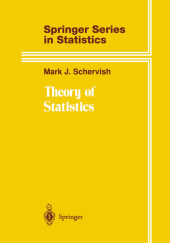 Neuerscheinungen 2012Stand: 2020-01-07 |
Schnellsuche
ISBN/Stichwort/Autor
|
Herderstraße 10
10625 Berlin
Tel.: 030 315 714 16
Fax 030 315 714 14
info@buchspektrum.de |

Mark J. Schervish
Theory of Statistics
Softcover reprint of the original 1st ed. 1995. 2012. xvi, 716 S. XVI, 702 pp. 26 figs. 235 mm
Verlag/Jahr: SPRINGER, BERLIN 2012
ISBN: 1-461-28708-1 (1461287081)
Neue ISBN: 978-1-461-28708-7 (9781461287087)
Preis und Lieferzeit: Bitte klicken
The aim of this graduate textbook is to provide a comprehensive advanced course in the theory of statistics covering those topics in estimation, testing, and large sample theory which a graduate student might typically need to learn as preparation for work on a Ph.D. An important strength of this book is that it provides a mathematically rigorous and even-handed account of both Classical and Bayesian inference in order to give readers a broad perspective. For example, the "uniformly most powerful" approach to testing is contrasted with available decision-theoretic approaches.
´Content.- 1: Probability Models.- 1.1 Background.- 1.1.1 General Concepts.- 1.1.2 Classical Statistics.- 1.1.3 Bayesian Statistics.- 1.2 Exchangeability.- 1.2.1 Distributional Symmetry.- 1.2.2 Frequency arid Exchangeability.- 1.3 Parametric Models.- 1.3.1 Prior, Posterior, and Predictive Distributions.- 1.3.2 Improper Prior Distributions.- 1.3.3 Choosing Probability Distributions.- 1.4 DeFinetti´s Representation Theorem.- 1.4.1 Understanding the Theorems.- 1.4.2 The Mathematical Statements.- 1.4.3 Some Examples.- 1.5 Proofs of DeFinetti´s Theorem and Related Results .- 1.5.1 Strong Law of Large Numbers.- 1.5.2 The Bernoulli Case.- 1.5.3 The General Finite Case .- 1.5.4 The General Infinite Case.- 1.5.5 Formal Introduction to Parametric Models .- 1.6 Infinite-Dimensional Parameters .- 1.6.1 Dirichlet Processes.- 1.6.2 Tailfree Processes+.- 1.7 Problems.- 2: Sufficient Statistics.- 2.1 Definitions.- 2.1.1 Notational Overview.- 2.1.2 Sufficiency.- 2.1.3 Minimal and Complete Sufficiency.- 2.1.4 Ancillarity.- 2.2 Exponential Families of Distributions.- 2.2.1 Basic Properties.- 2.2.2 Smoothness Properties.- 2.2.3 A Characterization Theorem .- 2.3 Information.- 2.3.1 Fisher Information.- 2.3.2 Kullback-Leibler Information.- 2.3.3 Conditional Information .- 2.3.4 Jeffreys´ Prior .- 2.4 Extremal Families .- 2.4.1 The Main Results.- 2.4.2 Examples.- 2.4.3 Proofs+.- 2.5 Problems.- Chapte 3: Decision Theory.- 3.1 Decision Problems.- 3.1.1 Framework.- 3.1.2 Elements of Bayesian Decision Theory.- 3.1.3 Elements of Classical Decision Theory.- 3.1.4 Summary.- 3.2 Classical Decision Theory.- 3.2.1 The Role of Sufficient Statistics.- 3.2.2 Admissibility.- 3.2.3 James-Stein Estimators.- 3.2.4 Minimax Rules.- 3.2.5 Complete Classes.- 3.3 Axiomatic Derivation of Decision Theory .- 3.3.1 Definitions and Axioms.- 3.2.2 Examples.- 3.3.3 The Main Theorems.- 3.3.4 Relation to Decision Theory.- 3.3.5 Proofs of the Main Theorems .- 3.3.6 State-Dependent Utility .- 3.4 Problems.- 4: Hypothesis Testing.- 4.1 Introduction.- 4.1.1 A Special Kind of Decision Problem.- 4.1.2 Pure Significance Tests.- 4.2 Bayesian Solutions.- 4.2.1 Testing in General.- 4.2.2 Bayes Factors.- 4.3 Most Powerful Tests.- 4.3.1 Simple Hypotheses and Alternatives.- 4.3.2 Simple Hypotheses, Composite Alternatives.- 4.3.3 One-Sided Tests.- 4.3.4 Two-Sided Hypotheses.- 4.4 Unbiased Tests.- 4.4.1 General Results.- 4.4.2 Interval Hypotheses.- 4.4.3 Point Hypotheses.- 4.5 Nuisance Parameters.- 4.5.1 Neyinan Structure.- 4.5.2 Tests about Natural Parameters.- 4.5.3 Linear Combinations of Natural Parameters.- 4.5.4 Other Two-Sided Cases .- 4.5.5 Likelihood Ratio Tests.- 4.5.6 The Standard F-Test as a Bayes Rule.- 4.6 P-Values.- 4.6.1 Definitions and Examples.- 4.6.2 P-Values and Bayes Factors.- 4.7 Problems.- 5: Estimation.- 5.1 Point Estimation.- 5.1.1 Minimum Variance Unbiased Estimation.- 5.1.2 Lower Bounds on the Variance of Unbiased Estimators.- 5.1.3 Maximum Likelihood Estimation.- 5.1.4 Bayesian Estimation.- 5.1.5 Robust Estimation .- 5.2 Set Estimation.- 5.2.1 Confidence Sets.- 5.2.2 Prediction Sets .- 5.2.3 Tolerance Sets .- 5.2.4 Bayesian Set Estimation.- 5.2.5 Decision Theoretic Set Estimation.- 5.3 The Bootstrap .- 5.3.1 The General Concept.- 5.3.2 Standard Deviations and Bias.- 5.3.3 Bootstrap Confidence Intervals.- 5.4 Problems.- 6: Equivariance .- 6.1 Common Examples.- 6.1.1 Location Problems.- 6.1.2 Scale Problems.- 6.2 Equivariant Decision Theory.- 6.2.1 Groups of Transformations.- 6.2.2 Equivariance and Changes of Units.- 6.2.3 Minimum Risk Equivariant Decisions.- 6.3 Testing and Confidence Intervals .- 6.3.1 P-Values in Invariant Problems.- 6.3.2 Equivariant Confidence Sets.- 6.3.3 Invariant Tests .- 6.4 Problems.- 7: Large Sample Theory.- 7.1 Convergence Concepts.- 7.1.1 Deterministic Convergence.- 7.1.2 Stochastic Convergence.- 7.1.3 The Delta Method.- 7.2 Sample Quantiles.-


